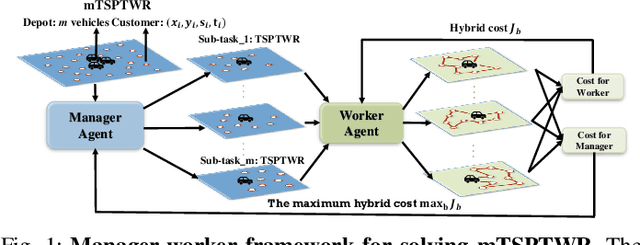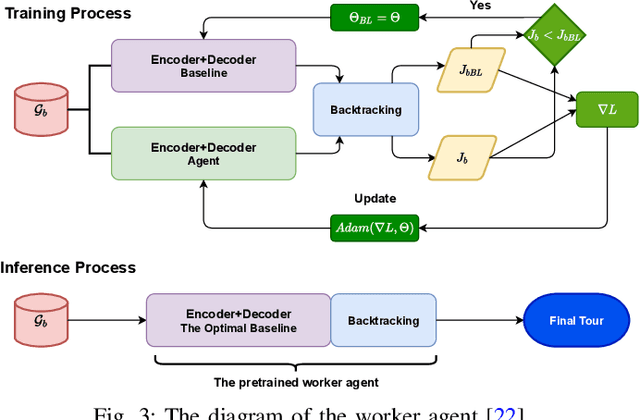Puay Siew Tan
Parametric Expensive Multi-Objective Optimization via Generative Solution Modeling
Nov 17, 2025Abstract:Many real-world applications require solving families of expensive multi-objective optimization problems~(EMOPs) under varying operational conditions. This gives rise to parametric expensive multi-objective optimization problems (P-EMOPs) where each task parameter defines a distinct optimization instance. Current multi-objective Bayesian optimization methods have been widely used for finding finite sets of Pareto optimal solutions for individual tasks. However, P-EMOPs present a fundamental challenge: the continuous task parameter space can contain infinite distinct problems, each requiring separate expensive evaluations. This demands learning an inverse model that can directly predict optimized solutions for any task-preference query without expensive re-evaluation. This paper introduces the first parametric multi-objective Bayesian optimizer that learns this inverse model by alternating between (1) acquisition-driven search leveraging inter-task synergies and (2) generative solution sampling via conditional generative models. This approach enables efficient optimization across related tasks and finally achieves direct solution prediction for unseen parameterized EMOPs without additional expensive evaluations. We theoretically justify the faster convergence by leveraging inter-task synergies through task-aware Gaussian processes. Meanwhile, empirical studies in synthetic and real-world benchmarks further verify the effectiveness of our alternating framework.
EffiReason-Bench: A Unified Benchmark for Evaluating and Advancing Efficient Reasoning in Large Language Models
Nov 13, 2025



Abstract:Large language models (LLMs) with Chain-of-Thought (CoT) prompting achieve strong reasoning but often produce unnecessarily long explanations, increasing cost and sometimes reducing accuracy. Fair comparison of efficiency-oriented approaches is hindered by fragmented evaluation practices. We introduce EffiReason-Bench, a unified benchmark for rigorous cross-paradigm evaluation of efficient reasoning methods across three categories: Reasoning Blueprints, Dynamic Execution, and Post-hoc Refinement. To enable step-by-step evaluation, we construct verified CoT annotations for CommonsenseQA and LogiQA via a pipeline that enforces standardized reasoning structures, comprehensive option-wise analysis, and human verification. We evaluate 7 methods across 6 open-source LLMs (1B-70B) on 4 datasets spanning mathematics, commonsense, and logic, and propose the E3-Score, a principled metric inspired by economic trade-off modeling that provides smooth, stable evaluation without discontinuities or heavy reliance on heuristics. Experiments show that no single method universally dominates; optimal strategies depend on backbone scale, task complexity, and architecture.
($\boldsymbolθ_l, \boldsymbolθ_u$)-Parametric Multi-Task Optimization: Joint Search in Solution and Infinite Task Spaces
Mar 11, 2025Abstract:Multi-task optimization is typically characterized by a fixed and finite set of optimization tasks. The present paper relaxes this condition by considering a non-fixed and potentially infinite set of optimization tasks defined in a parameterized, continuous and bounded task space. We refer to this unique problem setting as parametric multi-task optimization (PMTO). Assuming the bounds of the task parameters to be ($\boldsymbol{\theta}_l$, $\boldsymbol{\theta}_u$), a novel ($\boldsymbol{\theta}_l$, $\boldsymbol{\theta}_u$)-PMTO algorithm is crafted to enable joint search over tasks and their solutions. This joint search is supported by two approximation models: (1) for mapping solutions to the objective spaces of all tasks, which provably accelerates convergence by acting as a conduit for inter-task knowledge transfers, and (2) for probabilistically mapping tasks to the solution space, which facilitates evolutionary exploration of under-explored regions of the task space. At the end of a full ($\boldsymbol{\theta}_l$, $\boldsymbol{\theta}_u$)-PMTO run, the acquired models enable rapid identification of optimized solutions for any task lying within the specified bounds. This outcome is validated on both synthetic test problems and practical case studies, with the significant real-world applicability of PMTO shown towards fast reconfiguration of robot controllers under changing task conditions. The potential of PMTO to vastly speedup the search for solutions to minimax optimization problems is also demonstrated through an example in robust engineering design.
Learning to Search for Job Shop Scheduling via Deep Reinforcement Learning
Nov 27, 2022



Abstract:Recent studies in using deep reinforcement learning (DRL) to solve Job-shop scheduling problems (JSSP) focus on construction heuristics. However, their performance is still far from optimality, mainly because the underlying graph representation scheme is unsuitable for modeling partial solutions at each construction step. This paper proposes a novel DRL-based method to learn improvement heuristics for JSSP, where graph representation is employed to encode complete solutions. We design a Graph Neural Network based representation scheme, consisting of two modules to effectively capture the information of dynamic topology and different types of nodes in graphs encountered during the improvement process. To speed up solution evaluation during improvement, we design a novel message-passing mechanism that can evaluate multiple solutions simultaneously. Extensive experiments on classic benchmarks show that the improvement policy learned by our method outperforms state-of-the-art DRL-based methods by a large margin.
Learning to Solve Multiple-TSP with Time Window and Rejections via Deep Reinforcement Learning
Sep 13, 2022



Abstract:We propose a manager-worker framework based on deep reinforcement learning to tackle a hard yet nontrivial variant of Travelling Salesman Problem (TSP), \ie~multiple-vehicle TSP with time window and rejections (mTSPTWR), where customers who cannot be served before the deadline are subject to rejections. Particularly, in the proposed framework, a manager agent learns to divide mTSPTWR into sub-routing tasks by assigning customers to each vehicle via a Graph Isomorphism Network (GIN) based policy network. A worker agent learns to solve sub-routing tasks by minimizing the cost in terms of both tour length and rejection rate for each vehicle, the maximum of which is then fed back to the manager agent to learn better assignments. Experimental results demonstrate that the proposed framework outperforms strong baselines in terms of higher solution quality and shorter computation time. More importantly, the trained agents also achieve competitive performance for solving unseen larger instances.
Learning to Dispatch for Job Shop Scheduling via Deep Reinforcement Learning
Oct 23, 2020



Abstract:Priority dispatching rule (PDR) is widely used for solving real-world Job-shop scheduling problem (JSSP). However, the design of effective PDRs is a tedious task, requiring a myriad of specialized knowledge and often delivering limited performance. In this paper, we propose to automatically learn PDRs via an end-to-end deep reinforcement learning agent. We exploit the disjunctive graph representation of JSSP, and propose a Graph Neural Network based scheme to embed the states encountered during solving. The resulting policy network is size-agnostic, effectively enabling generalization on large-scale instances. Experiments show that the agent can learn high-quality PDRs from scratch with elementary raw features, and demonstrates strong performance against the best existing PDRs. The learned policies also perform well on much larger instances that are unseen in training.
Re-route Package Pickup and Delivery Planning with Random Demands
Jul 24, 2019



Abstract:Recently, a higher competition in logistics business introduces new challenges to the vehicle routing problem (VRP). Re-route planning, also known as dynamic VRP, is one of the important challenges. The re-route planning has to be performed when new customers request for deliveries while the delivery vehicles, i.e., trucks, are serving other customers. While the re-route planning has been studied in the literature, most of the existing works do not consider different uncertainties. Therefore, in this paper, we propose two systems, i.e., (i) an offline package pickup and delivery planning with stochastic demands (PDPSD) and (ii) a re-route package pickup and delivery planning with stochastic demands (Re-route PDPSD). Accordingly, we formulate the PDPSD system as a two-stage stochastic optimization. We then extend the PDPSD system to the Re-route PDPSD system with a re-route algorithm. Furthermore, we evaluate performance of the proposed systems by using the dataset from Solomon Benchmark suite and a real data from a Singapore logistics 1company. The results show that the PDPSD system can achieve the lower cost than that of the baseline model. In addition, the Re-route PDPSD system can help the supplier efficiently and successfully to serve more customers while the trucks are already on the road.
* 6 pages, 4 figures, 2 tables
 Add to Chrome
Add to Chrome Add to Firefox
Add to Firefox Add to Edge
Add to Edge